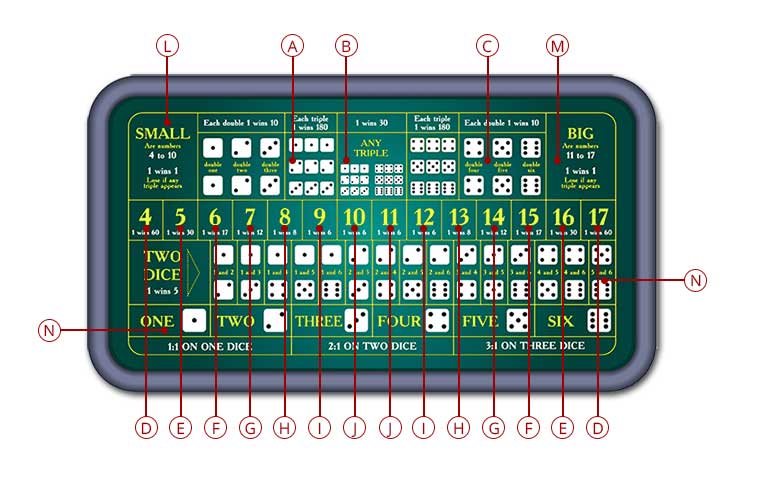How to Play Sic Bo
Sic Bo, sometimes called Tai Sai or Dai Siu, is a quick-fire game which is played using three dice and offers a fun alternative to games such as craps or roulette. The game’s popularity has exploded around the world over the past few decades due to its fast-paced nature and the fact that it appeals to casino players of all backgrounds.
Basic Rules
A Sic Bo board appears quite complicated at first glance, but the game is actually very simple. A dealer throws three dice in a small cage, sometimes called a “shaker”, and players simply bet on what they think the results will be by placing their chips on the layout. There are various different wagers that can be made and they all have different payouts based on the odds of the numbers being rolled. The main bets are:
- Big or Small - A bet that the total of the three dice will be from four to ten (small), or from 11 to 17 (big). Both bets lose if there is any triple, and is why three and 18 are not included in the range. The payout is 1:1 as it is considered an even money bet.
- Single number bets - A bet that a specific number from one to six will be rolled on any of the three dice. There is a payout of 1:1 if the number bet on is rolled once, 2:1 if the number is rolled twice and 12:1 if the number appears on all three dice.
- Triple - A bet that the same number will be rolled on all three dice. You can either bet on a specific number from one to six for a possible payout of 180:1, or bet on any triple being rolled for a payout of 30:1.
- Double - Also known as a pair, this is a bet that a specific number will appear on two of the three dice. The payout is 10:1.
- Three-dice total - A bet that the total of the three dice will be a specific number. The payout differs depending on which number you bet on; for example you will win £6 for every £1 staked on ten or 11, but you would win £60 for every £1 bet on four or 17 because the odds are longer.
- Combination - A bet on any two specific numbers being rolled on the three dice, for example betting on one and two. The payout is 6:1.

- ASPECIFIC TRIPLE pays 180 to 1 Three specific matching numbers you nominate. Triple 1, 2, 3, 4, 5 or 6.
- BANY TRIPLE pays 33 to 1 Any three matching numbers.
- CSPECIFIC DOUBLE pays 11 to 1 Two specific matching numbers you nominate. Double 1, 2, 3, 4, 5 or 6.
- DTOTAL VALUE OF 4 OR 17 pays 62 to 1 Sum of three dice totals 4 or 17.
- ETOTAL VALUE OF 5 OR 16 pays 31 to 1 Sum of three dice totals 5 or 16.
- FTOTAL VALUE OF 6 OR 15 pays 18 to 1 Sum of three dice totals 6 or 15.
- GTOTAL VALUE OF 7 OR 14 pays 12 to 1 Sum of three dice totals 7 or 14.
- HTOTAL VALUE OF 8 OR 13 pays 8 to 1 Sum of three dice totals 8 or 13.
- ITOTAL VALUE OF 9 OR 12 pays 7 to 1 Sum of three dice totals 9 or 12.
- JTOTAL VALUE OF 10 OR 11 pays 6 to 1 Sum of three dice totals 10 or 11.
- KTWO DICE COMBINATIONS 6 to 1 Specific combinations of two unmatched dice.
- LSMALL Even Money Sum of three dice totals between 4 and 10. Loses if any triple appears.
- MBIG Even Money Sum of three dice totals between 11 and 17. Loses if any triple appears.
-
NSPECIFIC NUMBER
A bet placed on a specific number being spun. The more dice featuring the nominated number, the higher the payout.
- ON ONE DIE - pays even money
- ON TWO DICE - pays 2 to 1
- ON THREE DICE - pays 12 to 1
Etiquette
As Sic Bo has spread worldwide from its origins in China, some of the traditional behavioural habits of players have also changed, but a table can still get quite crowded and a bit of physical contact may not be frowned upon as it would be during certain other casino games if you need to find room to place your bets.
However, you should not get carried away and it is best to act in as dignified a manner as possible, respecting the other punters and casino staff. Make sure to place bets at the right time and avoid trying to put down wagers during a live round as it will only slow the game down.
There are some traditional superstitions associated with Sic Bo. It is considered bad luck to touch another player’s shoulder or count your money while in play. However, players wishing to give themselves a bit of good luck can wear red at the tables, with some punters even wearing red underwear beneath their normal clothes for an extra boost of good fortune.
Strategy
Understanding the odds behind a game is the key to any casino strategy, and in Sic Bo the bet with the most favourable chance of success is the big/small option. The payout of 1:1 may not sound the most appealing but the odds are close to 50-50. The house edge comes from the fact that any triple counts as a loss.
As the odds of success are close to 1 in 2, many Sic Bo players like to employ progressive betting strategies, which aim to guard against the risks of losing sequences by altering the size of the stake from one round to the next. One example is the d’Alembert model, where a player increases their bet by 1 after every loss, and reduces the wager by 1 after every win. The pattern ends when the required bet is zero and then begins again.
Another Sic Bo policy favoured by some players is to combine bets in an effort to maximise the chances of winning. For example, at the same time as betting £2 on big, you also bet £1 on Double 1. The big bet will win almost half the time and Double 1 will win almost 7% of the time, so statistically you have a 55.56% chance of winning on all wagers.
Chuck-a-luck
There are many different variations of Sic Bo and one of the most popular versions is Chuck-a-luck, which is also sometimes known as ‘birdcage’ or “sweat-cloth’. It is basically the same game but with fewer options, which makes the game simpler to play and understand for many players, but removes some of the fun for others. The layout of a Chuck-a-luck board reflects the differences inherent in the game and does not appear to be as “cluttered” as a regular Sic Bo board. There are no dice printed on the felt; instead, the top of the layout features the numbers from one to six while the bottom centre of the layout features numbers five to 16. Odd/even and high/low bets are printed on the sides. Three dice are held in a shaker resembling a birdcage, hence the nickname, and are rolled as players bet on the winning combination.
In Chuck-a-luck, players can make bets on single numbers just like in Sic Bo, but combination, three-dice total and double wagers are not included. It is usually possible to bet on big or small or any triple, while a field bet is also sometimes offered where players have the chance to back a range of numbers. For example, a bet would win if the total thrown is outside the range of eight to 12.
Important Terms:
Visit the Casino Glossary for more terms which you might find are used when playing Sic Bo and other table games.
